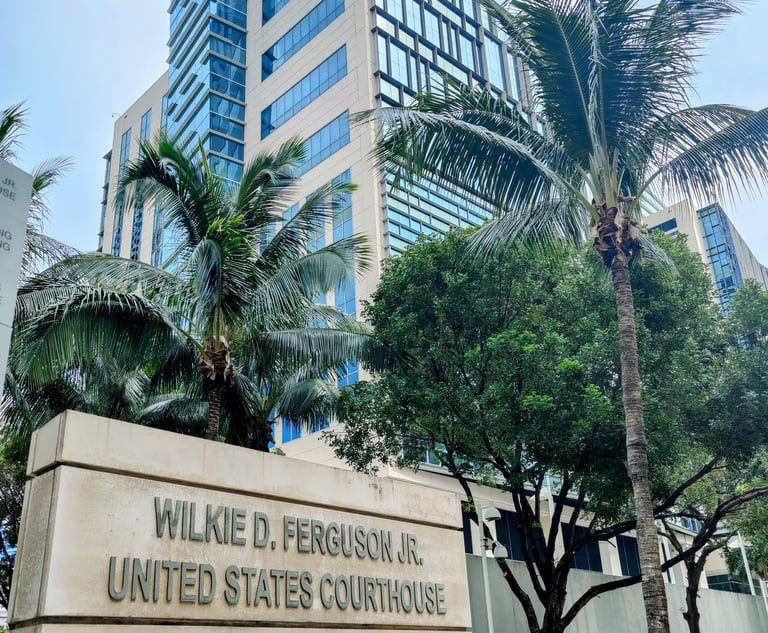 Blue-green algae. Credit: Cheng Wei/Shutterstock.com
Blue-green algae. Credit: Cheng Wei/Shutterstock.comDeSantis Likely to Get Environmental Money in Legislative Session
Gov. Ron DeSantis' $625 million request includes money for Everglades restoration, fighting toxic algae outbreaks and boosting the Florida Forever land-preservation program, all issues popular among lawmakers and environmentalists.
January 08, 2020 at 12:42 PM
6 minute read
Gov. Ron DeSantis appears poised for a victory as he seeks environmental money to combat water-quality problems that plague the state.
DeSantis' $625 million request for the upcoming legislative session includes money for Everglades restoration, fighting toxic algae outbreaks and boosting the Florida Forever land-preservation program, all issues popular among lawmakers and environmentalists.
The proposal is the second part of an ambitious four-year $2.5 billion request, with DeSantis seeking a baseline amount of $625 million annually. Lawmakers exceeded that amount by nearly $50 million in the current year.
"Floridians across the spectrum, you know, really feel like that's a direction we need to keep going in," DeSantis said in October. "So, we're going to do it."
Still, environmentalists, pointing to how the money is used, say more is needed.
"Governor DeSantis is right to invest taxpayer dollars in Everglades restoration and projects to improve our water quality. Yet, Florida's ecological problems are so devastating that significantly more funding is needed to save our state from permanent ruin," said Aliki Moncrief, executive director of Florida Conservation Voters. "Sadly, the governor and legislative leaders seem unwilling to generate the revenue necessary to help us confront these growing challenges."
Environmentalists argue more could be done if lawmakers better followed the will of voters, who in 2014 approved a constitutional amendment that directed 33 percent of a real-estate tax go to land buying and preservation. Environmental groups have been tangled in a legal battle with the state over allegations that the Legislature improperly diverted money to other uses.
For the current fiscal year, the Land Acquisition Trust Fund, which handles the voter-approved money, accounts for $887 million of the budget.
Moncrief also suggested DeSantis direct water management districts to raise property taxes, which were capped under former Gov. Rick Scott, now a U.S. senator.
"But money isn't our only problem," Moncrief said. "All investments in our ecological infrastructure must come with compatible environmental safeguards and improved enforcement. Otherwise, we are squandering taxpayer dollars and losing precious time in the race against climate change and to reduce our reliance on dirty fossil fuels."
DeSantis proposed the $625 million in spending for the 2020-2021 fiscal year, which will start July 1. Lawmakers will negotiate the budget during the legislative session that starts next Tuesday.
DeSantis' environmental proposal includes $322 million for Everglades restoration projects, $150 million for water quality improvements, $50 million for springs restoration and more than $22 million to combat algal blooms and red tide.
Another $50 million would help eroded shorelines and $9 million would go for coral reef protection. DeSantis proposed spending $100 million on the Florida Forever program, which prior to the recession a decade ago was funded at $300 million a year.
The current year's budget has $33 million for Florida Forever.
Senate President Bill Galvano, R-Bradenton, said he couldn't assure funding for Florida Forever will make the final 2020-2021 budget, but he supports the governor's request to make $100 million an annually recurring amount. That proposal is included in a bill (SB 332) already moving forward in the Senate.
"I support the governor's approach on that, and I think it's an important program," Galvano said. "In talking with [Appropriations] Chair [Rob] Bradley, we're looking at our budget numbers and we'll have, you know, our final numbers really early in session. But to the extent that we can meet that, that commitment, I'm in favor of it."
Sen. Linda Stewart, an Orlando Democrat sponsoring the Florida Forever bill, said the money could be used to preserve land around three proposed multi-use corridors from Collier County to the Georgia State Line that would include new or expanded toll roads. The proposed projects, a priority of Galvano, are known as Multi-use Corridors of Regional Economic Significance, or M-CORES.
"In fact, the M-CORES, toll road discussions that have been taking place now … will require additional land acquisition that is going to be needed to support necessary environmental infrastructure," said Stewart, who would prefer $300 million for Florida Forever rather than her $100 million ask. "So, we're going to need more funds, we're going to need more funds for the projects that we already have on the books and also to look forward to what we might need to do in order that we can preserve the necessary environmental infrastructure for our future."
Deborah Foote, government affairs and political director for Sierra Club Florida, contends $100 million for Florida Forever isn't enough, as the state isn't "making any more land due to sea level rise."
"Floridians have waited five years since the passage of the land, water and land conservation amendment in 2014 to see this funding for this vital [Florida Forever] program restored," Foote said, adding that conservation lands are critical for a variety of purposes such as ensuring a sustainable water supply and restoring springs, rivers and wetlands.
Since the passage of the amendment in 2014, legislators have directed that at least $200 million each year to the Everglades, $64 million to a reservoir in the Everglades Agricultural Area, $50 million to state's natural springs and $5 million to Lake Apopka.
However, not all the money in the trust fund is being used directly for land preservation or acquisition, which remains the issue of the ongoing legal challenge.
Line items tied to the trust fund in the current budget include $174.7 million to help cover the salaries and benefits of 6,858 employees at agencies including the Florida Fish and Wildlife Conservation Commission, the Department of Environmental Protection, the Florida Forest Service and the Department of State.
Debt service, which includes repaying Save Our Everglades bonds, accounts for $158.3 million. Line items listed as "expenses" under the various agencies tallies another $17.8 million from the fund.
Moncrief said it's never too early to think about going back to the voters to maintain the funding and "correct the mistakes of an unwilling and incapable legislature."
Jim Turner reports for the News Service of Florida.
This content has been archived. It is available through our partners, LexisNexis® and Bloomberg Law.
To view this content, please continue to their sites.
Not a Lexis Subscriber?
Subscribe Now
Not a Bloomberg Law Subscriber?
Subscribe Now
NOT FOR REPRINT
© 2024 ALM Global, LLC, All Rights Reserved. Request academic re-use from www.copyright.com. All other uses, submit a request to [email protected]. For more information visit Asset & Logo Licensing.
You Might Like
View All

'Stab Venequip in the Back': Caterpillar Faces $100M Lawsuit in Miami Federal Court
3 minute read
Another Roundup Trial Kicks Off in Missouri. Monsanto Faces 3 Plaintiffs
4 minute read
Trending Stories
- 1Gibson Dunn Sued By Crypto Client After Lateral Hire Causes Conflict of Interest
- 2Trump's Solicitor General Expected to 'Flip' Prelogar's Positions at Supreme Court
- 3Pharmacy Lawyers See Promise in NY Regulator's Curbs on PBM Industry
- 4Outgoing USPTO Director Kathi Vidal: ‘We All Want the Country to Be in a Better Place’
- 5Supreme Court Will Review Constitutionality Of FCC's Universal Service Fund
Who Got The Work
Michael G. Bongiorno, Andrew Scott Dulberg and Elizabeth E. Driscoll from Wilmer Cutler Pickering Hale and Dorr have stepped in to represent Symbotic Inc., an A.I.-enabled technology platform that focuses on increasing supply chain efficiency, and other defendants in a pending shareholder derivative lawsuit. The case, filed Oct. 2 in Massachusetts District Court by the Brown Law Firm on behalf of Stephen Austen, accuses certain officers and directors of misleading investors in regard to Symbotic's potential for margin growth by failing to disclose that the company was not equipped to timely deploy its systems or manage expenses through project delays. The case, assigned to U.S. District Judge Nathaniel M. Gorton, is 1:24-cv-12522, Austen v. Cohen et al.
Who Got The Work
Edmund Polubinski and Marie Killmond of Davis Polk & Wardwell have entered appearances for data platform software development company MongoDB and other defendants in a pending shareholder derivative lawsuit. The action, filed Oct. 7 in New York Southern District Court by the Brown Law Firm, accuses the company's directors and/or officers of falsely expressing confidence in the company’s restructuring of its sales incentive plan and downplaying the severity of decreases in its upfront commitments. The case is 1:24-cv-07594, Roy v. Ittycheria et al.
Who Got The Work
Amy O. Bruchs and Kurt F. Ellison of Michael Best & Friedrich have entered appearances for Epic Systems Corp. in a pending employment discrimination lawsuit. The suit was filed Sept. 7 in Wisconsin Western District Court by Levine Eisberner LLC and Siri & Glimstad on behalf of a project manager who claims that he was wrongfully terminated after applying for a religious exemption to the defendant's COVID-19 vaccine mandate. The case, assigned to U.S. Magistrate Judge Anita Marie Boor, is 3:24-cv-00630, Secker, Nathan v. Epic Systems Corporation.
Who Got The Work
David X. Sullivan, Thomas J. Finn and Gregory A. Hall from McCarter & English have entered appearances for Sunrun Installation Services in a pending civil rights lawsuit. The complaint was filed Sept. 4 in Connecticut District Court by attorney Robert M. Berke on behalf of former employee George Edward Steins, who was arrested and charged with employing an unregistered home improvement salesperson. The complaint alleges that had Sunrun informed the Connecticut Department of Consumer Protection that the plaintiff's employment had ended in 2017 and that he no longer held Sunrun's home improvement contractor license, he would not have been hit with charges, which were dismissed in May 2024. The case, assigned to U.S. District Judge Jeffrey A. Meyer, is 3:24-cv-01423, Steins v. Sunrun, Inc. et al.
Who Got The Work
Greenberg Traurig shareholder Joshua L. Raskin has entered an appearance for boohoo.com UK Ltd. in a pending patent infringement lawsuit. The suit, filed Sept. 3 in Texas Eastern District Court by Rozier Hardt McDonough on behalf of Alto Dynamics, asserts five patents related to an online shopping platform. The case, assigned to U.S. District Judge Rodney Gilstrap, is 2:24-cv-00719, Alto Dynamics, LLC v. boohoo.com UK Limited.
Featured Firms
Law Offices of Gary Martin Hays & Associates, P.C.
(470) 294-1674
Law Offices of Mark E. Salomone
(857) 444-6468
Smith & Hassler
(713) 739-1250






